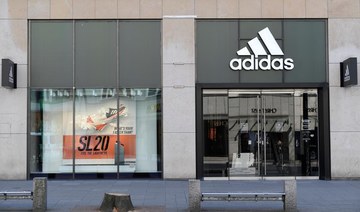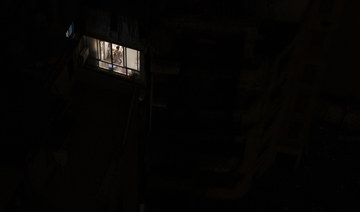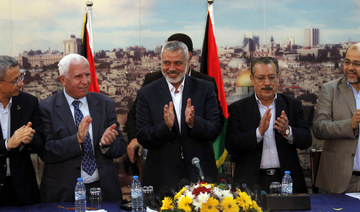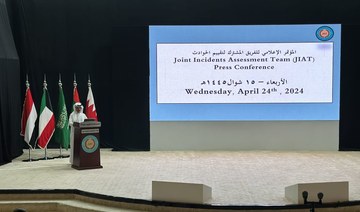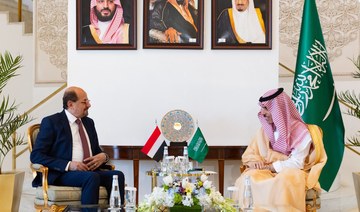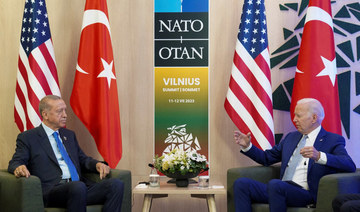BEIRUT: The lines snaked around the block. Then they swelled to fill the whole street, before they turned into a raucous mob of men shoving to the front of the line. There at the exchange bureau, they could buy rationed dollars, the hottest commodity in Lebanon.
The small Mediterranean country’s financial meltdown has thrown Lebanese into a frantic search for dollars as their local currency’s value evaporates. To get the precious hard currency, they must navigate labyrinthine regulations, exploiting any loopholes they can to rescue their earnings.
Every transaction, from doctor fees to store purchases to rent, is negotiated day by day, juggling the tumbling Lebanese pound and multiple, changing dollar exchange rates. Those who can are snapping up luxury goods or real estate, trying to use their dollars trapped in bank accounts frozen by the cash-strapped authorities.
The turmoil is deepening resentment of the political elite and the once flourishing banking system — and fueling desperation.
“They are going to crash us into a wall,” Chris Georgian, a 25-year-old student, said, trying to buy $600 at an exchange bureau to send for his university fees in Armenia.
Last week, a 61-year-old man apparently distraught over his economic situation shot and killed himself on a Beirut commercial street, one of multiple suicides during the crisis.
Despite survival skills honed by political tension and wars, nothing prepared Lebanese for having to line up to buy money.
During the 15-year civil war and Israel’s invasion and occupation of the south and Beirut, there may have been queues for water or bread, but Lebanon was always flush with dollars.
Since 1997, the local currency, the pound, was pegged at around 1,500 to the dollar, and Lebanese used the two interchangeably.
That stability was built on what experts say was essentially a Ponzi scheme that let banks and the elite profit while allowing Lebanese to live beyond their means.
Successive governments borrowed from private banks to finance massive public debt and pay for vital imports like fuel — but also luxury goods — eating into depositors’ dollar accounts. Most of those deposits were from Lebanese expats attracted by high interest rates.
It collapsed when remittances and direct foreign investments plunged in recent years.
In the ensuing liquidity crunch, the pound has lost nearly 85% of its value. Tens of thousands have fallen into poverty, wages are worth only a fraction of what they once were, and prices are skyrocketing — stripping Lebanon of its trademark joie de vivre and vibrancy.
Chain retailers have shut down, unable to import or price goods with the fluctuating rates. Some vendors have either closed or only take payment in dollars.
Dollar accounts have been frozen, and those trapped dollars have become “Monopoly money” with no value outside Lebanon, said Dan Azzi, a former banker and analyst. He coined a name for that currency, the “Lollar” or Lebanese dollar.
People began hoarding cash dollars, getting relatives living abroad to transfer dollars, which — unlike frozen local accounts — can be withdrawn from the bank.
Some sell gold for dollars. “We buy gold at the highest price $39-$55 and in cash,” reads one jeweler’s marketing telephone message.
The peg remains in place officially, even as the black market price of a dollar has spiraled to at least five times that. Meanwhile, authorities imposed rationing on exchange bureaus, limiting how many dollars a person can buy and setting a rate higher than the peg but lower than the black market.
That fanned the raucous lines. Some bought dollars only to sell them on the black market. New phone apps cropped up to keep track of multiple rates.
“Isn’t all this humiliating?” said Elie, a security guard keeping order at an exchange bureau. “When senior officials were making money, we were getting some of it. Now they aren’t anymore, so they deny it to us,” he said, declining to give his last name because of his job.
Many scramble for ways to use their trapped “Lollars,” fearing they could eventually lose them completely.
Lines formed outside luxury retailer Louis Vuitton because it was selling at a rate half the black market. Others use stuck dollars to settle bank loans, still valued at the official peg. Azzi estimates loans up to $15 billion have been paid already.
Ghassan Frem, a dentist, paid a friend’s loan of over $30,000 with his “Lollars.” She paid him the money in an account abroad. It is a win-win: He uses his “dead” dollars, and the friend settles her loan at a discount.
Meanwhile, Frem bought $950-worth of new air conditioners on his credit card. The trick is: He pays his credit card bill at the official rate with pounds he bought on the black market for far fewer dollars.
Many use this loophole, buying merchandise or doing renovations whether they need it or not, to rescue trapped dollars.
“Anyone who can get back at the banks is doing some good,” Frem said. “We do to them what they have done to us.”
On social media, some proposed organizing a peer-to-peer platform to avoid using banks.
Meanwhile, real estate transactions jumped more than 16% in the first quarter of 2020, according to the General Directorate of Land Registry. One of Lebanon’s largest real estate companies, Solidere, reported a profit for the first time since 2018.
For his dentist clinic, Frem negotiates purchasing supplies item by item, hour by hour. One Monday afternoon, he ordered a product and by the time it arrived the next day, the dollar price had gone up 20%. “The delivery guy got a text message with the new price when he arrived,” Frem said.
For Georgian, the student, his education is on the line.
A third-year psychology student in a Yerevan university, he returned to Lebanon because of coronavirus. With his parents’ dollars locked up, he has to chase dollars to finance his return.
At the exchange office, he asked the guard to walk him through the documents he needed. Under new rules to curb profiteering, you must prove you need rationed dollars to pay education fees, rent, medical fees or salaries for foreign workers. No one gets cash — the dollars you buy are sent directly to the destination.
Still, Georgian was relieved. His school fees are $600, and the cost for that at the exchange is about half what it would be on the black market, saving him enough to live for months in Yerevan.
“If the dollar keeps rising, I will never go back,” he said. “I will lose my education.”
Georgian questioned his parents’ decision to remain in Lebanon despite constant complaints of corruption.
“They said they didn’t think it will be this bad,” he said, shaking his head.
Hottest commodity in Lebanon’s economic chaos: The US dollar
https://arab.news/b9cgg
Hottest commodity in Lebanon’s economic chaos: The US dollar
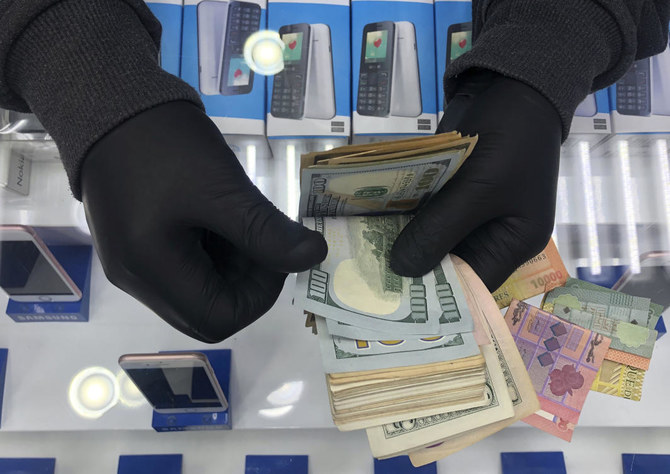
- The financial meltdown has thrown Lebanese into a frantic search for dollars as their local currency’s value evaporates
Israeli soldiers kill two Palestinian gunmen in West Bank, military says
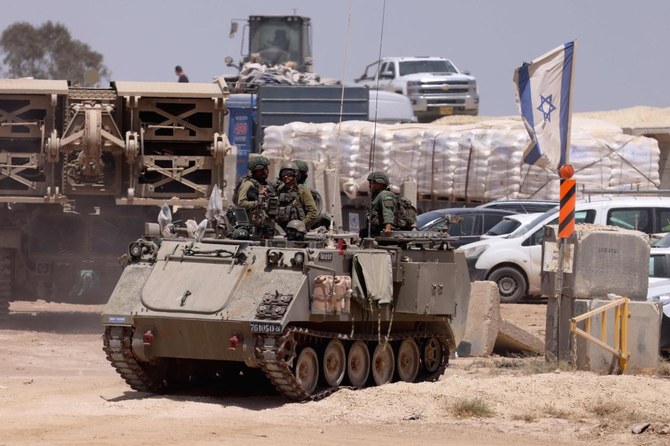
- Violence has been on the rise as Israel presses its attacks and bombardment in Gaza
The military released a photo of two automatic rifles that it said were used by several gunmen to shoot at the soldiers, at an outpost near the flashpoint Palestinian city of Jenin.
The official Palestinian news agency Wafa said security officials confirmed two deaths and the health ministry said two other men were wounded.
There was no other immediate comment from Palestinian officials in the West Bank, where violence has been on the rise as Israel presses its war against Palestinian militant group Hamas in Gaza.
Israel launched its offensive in Gaza after Hamas led an attack on southern Israel on Oct. 7 in which 1,200 people were killed and 253 taken hostage. More than 34,000 Palestinians have since been killed and most of the population displaced.
Violence in the West Bank, which had already been on the rise before the war, has since flared with stepped up Israeli raids and Palestinian street attacks.
The West Bank and Gaza, territories Israel captured in the 1967 war, are among the territories which the Palestinians seek for a state. US-brokered peace talks collapsed a decade ago.
Hamas says it received Israel’s response to its ceasefire proposal
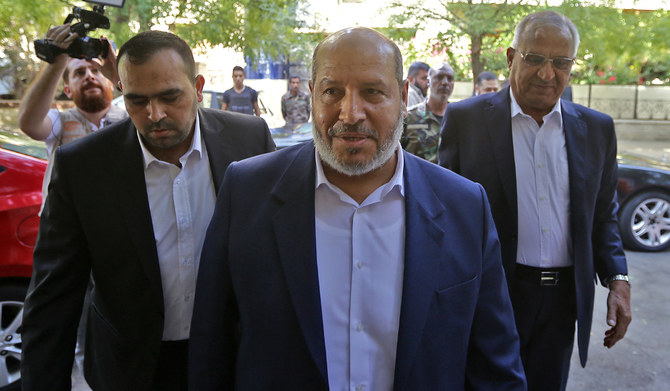
- White House national security adviser Jake Sullivan said on Friday he saw fresh momentum in talks to end the war and return the remaining hostages
- Israel has killed more than 34,000 Palestinians in Gaza, mostly women and children, according to the health ministry in the Hamas-run territory
CAIRO: Hamas said it had received on Saturday Israel’s official response to its latest ceasefire proposal and will study it before submitting its reply, the group’s deputy Gaza chief said in a statement.
“Hamas has received today the official response of the Zionist occupation to the proposal presented to the Egyptian and the Qatari mediators on April 13,” Khalil Al-Hayya, who is currently based in Qatar, said in a statement published by the group.
After more than six months of war with Israel in Gaza, the negotiations remain deadlocked, with Hamas sticking to its demands that any agreement must end the war.
An Egyptian delegation visited Israel for discussion with Israeli officials on Friday, looking for a way to restart talks to end the conflict and return remaining hostages taken when Hamas fighters stormed into Israeli towns on Oct. 7, an official briefed on the meetings said.
The official, who spoke on condition of anonymity, said Israel had no new proposals to make, although it was willing to consider a limited truce in which 33 hostages would be released by Hamas, instead of the 40 previously under discussion.
On Thursday, the United States and 17 other countries appealed to Hamas to release all of its hostages as a pathway to end the crisis.
Hamas has vowed not to relent to international pressure but in a statement it issued on Friday it said it was “open to any ideas or proposals that take into account the needs and rights of our people.”
However, it stuck to its key demands that Israel has rejected, and criticized the joint statement issued by the USand others for not calling for a permanent ceasefire and the withdrawal of Israeli forces from Gaza.
White House national security adviser Jake Sullivan said on Friday he saw fresh momentum in talks to end the war and return the remaining hostages.
Citing two Israeli officials, Axios reported that Israel told the Egyptian mediators on Friday that it was ready to give hostage negotiations “one last chance” to reach a deal with Hamas before moving forward with an invasion of Rafah, the last refuge for around a million Palestinians who fled Israeli forces further north in Gaza earlier in the war.
Meanwhile, in Rafah, Palestinian health officials said an Israeli air strike on a house killed at least five people and wounded others.
Hamas fighters stormed into Israeli towns on Oct. 7, killing 1,200 people and capturing 253 hostages. Israel has sworn to annihilate Hamas in an onslaught that has killed more than 34,000 Palestinians.
Yemen’s Houthis say their missile hit Andromeda Star oil ship in Red Sea
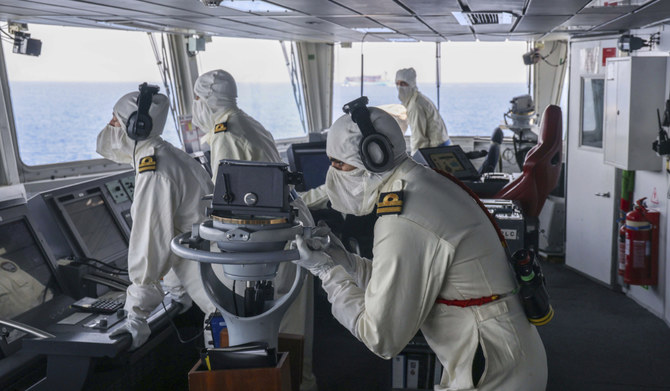
- US military confirmed that the Houthis launched three anti-ship ballistic missiles but caused minor damage to the ship
- A missile landed in the vicinity of a second vessel, the MV Maisha, but it was not damaged, US Centcom said on social media site X
CAIRO/LOS ANGELES: Yemen’s Houthis said on Saturday their missiles hit the Andromeda Star oil tanker in the Red Sea, as they continue attacking commercial ships in the area in a show of support for Palestinians fighting Israel in the Gaza war.
US Central Command confirmed that Iran-backed Houthis launched three anti-ship ballistic missiles into the Red Sea from Yemen causing minor damage to the Andromeda Star.
The ship’s master reported damage to the vessel, British maritime security firm Ambrey said.
A missile landed in the vicinity of a second vessel, the MV Maisha, but it was not damaged, US Central Command said on social media site X.
Houthi spokesman Yahya Sarea said the Panama-flagged Andromeda Star was British owned, but shipping data shows it was recently sold, according to LSEG data and Ambrey.
Its current owner is Seychelles-registered. The tanker is engaged in Russia-linked trade. It was en route from Primorsk, Russia, to Vadinar, India, Ambrey said.
Iran-aligned Houthi militants have launched repeated drone and missile strikes in the Red Sea, Bab Al-Mandab Strait and Gulf of Aden since November, forcing shippers to re-route cargo to longer and more expensive journeys around southern Africa and stoking fears the Israel-Hamas war could spread and destabilize the Middle East.
The attack on the Andromeda Star comes after a brief pause in the Houthis’ campaign that targets ships with ties to Israel, the United States and Britain.
The USS Dwight D. Eisenhower aircraft carrier sailed out of the Red Sea via the Suez Canal on Friday after assisting a US-led coalition to protect commercial shipping.
The Houthis on Friday said they downed an American MQ-9 drone in airspace of Yemen’s Saada province.
Syrian woman is jailed for life over Istanbul killer blast; over 20 others also get prison sentences
Syrian woman is jailed for life over Istanbul killer blast; over 20 others also get prison sentences
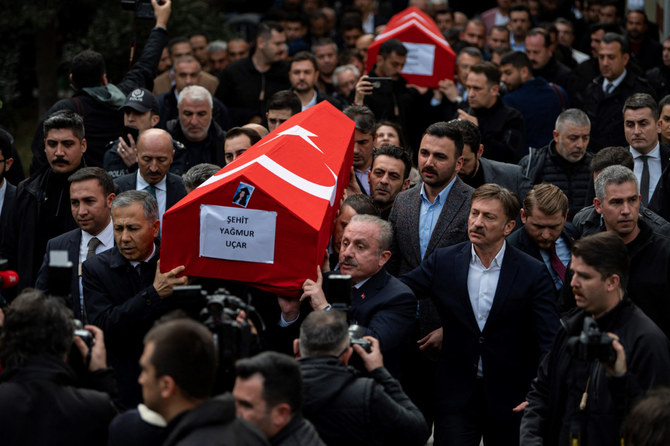
- Ahlam Albashir was given a total of seven life sentences by a Turkish court for carrying out the attack in Istiklal Avenue on Nov. 13, 2022
- Twenty others were given prison sentences ranging from four years to life
JEDDAH: A Syrian woman who planted a bomb that killed six people in Istanbul’s main shopping street 18 months ago was jailed for life on Friday.
Ahlam Albashir was given a total of seven life sentences by a Turkish court for carrying out the attack in Istiklal Avenue on Nov. 13, 2022. Six Turkish citizens, two members each from three families, died in the blast in the busy street packed with shoppers and tourists. About 100 people were injured.
More than 30 other people were accused in connection with the explosion. Four were released from prison on Friday, and a further 10 were ordered to be tried separately in their absence because they could not be found.
Twenty others were given prison sentences ranging from four years to life. Of those, six received aggravated life imprisonment for murder and “disrupting the unity and integrity of the state.”
Turkiye blamed Kurdish militants for the explosion, and said the order for the attack was given in Kobani in northern Syria, where Turkish forces have conducted operations against the Syrian Kurdish YPG militia in recent years.
The YPG and the outlawed PKK Kurdish separatist group, which has fought a decades-old insurgency against the Turkish state, denied involvement in the attack. No group admitted it.
Istanbul has been attacked in the past by Kurdish, Islamist and leftist militants. A wave of bombings and other attacks began nationwide when a ceasefire between Ankara and the PKK broke down in mid-2015.
More than 40,000 people have been killed in the PKK’s conflict with Turkiye since the militant group took up arms in 1984. It is considered a terrorist organisation by Turkiye, the EU and the US.
1 case dismissed, 4 on hold in UN investigation into Oct. 7 allegations against UNRWA staff
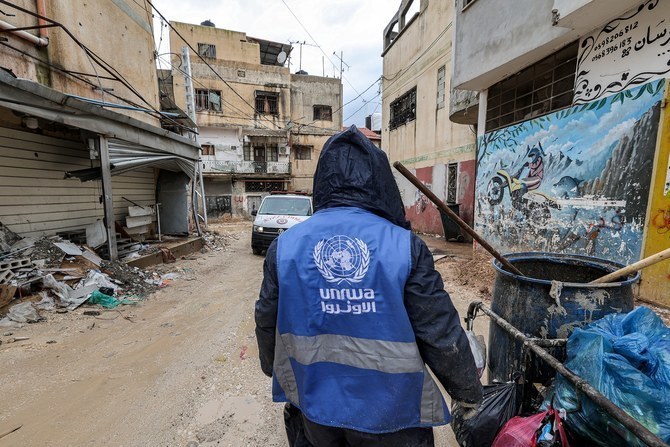
- Investigators have been looking into cases of 12 agency workers accused by Israel in January of participating in attacks by Hamas, and 7 others named later
- 14 cases remain under investigation but the others were dismissed or suspended due to lack of evidence; UN’s internal investigators due to visit Israel again in May
NEW YORK CITY: UN spokesperson Stephane Dujarric said on Friday that the organization’s internal oversight body has been investigating 19 employees of the UN Relief and Works Agency for Palestine Refugees over allegations that they were affiliated with Hamas and other militant groups.
Israeli authorities alleged in January that 12 UNRWA workers participated in the Oct. 7 attacks by Hamas against Israel.
The agency immediately cut ties with the named individuals, and UN Secretary-General Antonio Guterres, in consultation with UNRWA Commissioner General Philippe Lazzarini, ordered an independent review to evaluate the measures taken by the agency to ensure adherence to the principle of neutrality and how it responds to allegations of breaches of neutrality, particularly in the challenging context of the situation in Gaza.
In a wide-ranging report published this week, the investigators, led by Catherine Colonna, a former foreign minister of France, said Israeli authorities have yet to provide any evidence to support the allegations against UNRWA workers. They also noted that Israel had not previously raised concerns about any individuals named on the agency staffing lists it has been receiving since 2011.
They stated in the report: “In the absence of a political solution between Israel and the Palestinians, UNRWA remains pivotal in providing life-saving humanitarian aid and essential social services, particularly in health and education, to Palestinian refugees in Gaza, Jordan, Lebanon, Syria and the West Bank.
“As such, UNRWA is irreplaceable and indispensable to Palestinians’ human and economic development. In addition, many view UNRWA as a humanitarian lifeline.”
Guterres also ordered a separate investigation by the UN’s own Office of Internal Oversight Services to determine the accuracy of the Israeli allegations. The mandate of the OIOS, an independent office within the UN Secretariat, is to assist the secretary-general in the handling of UN resources and staff through the provision of internal audit, investigation, inspection and evaluation services.
Dujarric said the 19 members of UNRWA staff under investigation included the 12 named by the Israeli allegations in January, whose contracts were immediately terminated, and seven others the UN subsequently received information about, five in March and two in April.
Of the 12 employees identified by Israeli authorities in January, eight remain under OIOS investigation, Dujarric said. One case was dismissed for lack of evidence and corrective administrative action is being explored, he added, and three cases were suspended because “the information provided by Israel is not sufficient for OIOS to proceed with an investigation. UNRWA is considering what administrative action to take while they are under investigation.”
Regarding the seven additional cases brought to the attention of the UN, one has been suspended “pending receipt of additional supporting evidence,” Dujarric said.
“The remaining six of those cases are currently under investigation by OIOS. OIOS has informed us that its investigators had traveled to Israel for discussions with the Israeli authorities and will undertake another visit during May.
“These discussions are continuing and have so far been productive and have enabled progress on the investigations.”
The initial allegations against some members of its staff threw the agency, which provides aid and other services to Palestinian refugees in Gaza and across the region, into crisis. The US, the biggest single funder of UNRWA, and several other major donors put their contributions to the organization on hold.
In all, 16 UN member states suspended or paused donations, while others imposed conditions on further contributions, putting the future of the agency in doubt. Many of the countries, including Germany, later said their funding would resume. However, US donations remain on hold.



